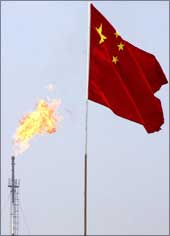 Energy-hungry China has signed a landmark $40 billion deal to buy liquefied natural gas (LNG) from Australia for 20 years that Chinese officials say would put the strained relations between Beijing and Canberra back on track.
Energy-hungry China has signed a landmark $40 billion deal to buy liquefied natural gas (LNG) from Australia for 20 years that Chinese officials say would put the strained relations between Beijing and Canberra back on track.
Under the deal, the China National Offshore Oil Corporation, will buy 3.6 million tonnes of LNG per year from British gas producer BG Group's Curtis LNG facility in Queensland in Australia, official China Daily reported on Thursday.
It is the world's first purchase agreement for supply of LNG from coal seam gas, and marks the first sale of LNG from coal seam gas to China, it quoted CNOOC as saying in a statement.
It is one of Australia's biggest single company-to-company LNG contract.
The deal is worth about $40 billion based on a crude oil price of $70 per barrel, BG chief executive Frank Chapman said after the signing ceremony.
The multi-billion-dollar deal suggests that Sino-Australian commercial ties have been largely unaffected by other tensions such as the Rio Tinto case, said analysts.
The deal was announced even as a Chinese court in Shanghai on Wednesday concluded its three-day trial of four of Australian company's Rio Tinto executives, under trial for bribery and industrial espionage.
The four, including Australian national Stern Hu and his three Chinese colleagues -- Liu Caikui, Ge Minqiang and Wang Yong -- were charged with taking bribes of more than 86 million yuan ($12.6 million) and stealing commercial secrets.
All four pleaded guilty to bribery charges on the first day of the trial although they disputed the specifics of the charges.
The guilty plea came as a surprise to many as Rio Tinto had earlier defended the innocence of its four employees, claiming that they "had done nothing wrong".
The detention of the four, angered Australia and affected its relations during the past few months.
But the two appeared to have warmed up to commercial ties again with Rio Tinto signing a deal last week with China's state-backed metals group CHINALCO to develop a massive iron ore mine in West Africa.
Under the deal CHINALCO will pay $0.85 billion for 47 per cent of the Simandou project in Guinea.
"Energy collaboration will be increasingly important in Sino-Australia commercial ties. The two countries, which have vital roles to play in global energy security, will undoubtedly strengthen cooperation in the area," said Huo Jianguo, researcher at the Trade Research Institute affiliated to the ministry of commerce.
"Resources are the backbone of Australia's trading relationship with China. One-third of Australia's mineral exports go to China, and China is our second-largest trading partner for LNG," the daily quoted Australian resources and energy minister Martin Ferguson. "Australia's trading relationship with China is healthy and mutually beneficial," said Ferguson, adding that his country is committed to strengthening that relationship.
More than $26 billion of Chinese investment was approved in the Australian resources sector in 2008 and 2009, he said.
Under the latest agreement, CNOOC will acquire a 5 per cent equity interest in the reserves and resources of certain BG Group tenements in the Surat Basin in Queensland. CNOOC will become a 10 per cent equity investor in the first of the two liquefaction trains, which will form the first phase of the Curtis project.
BG Group and CNOOC will also build two LNG ships in China.
Use of natural gas fits well with China's efforts to build an environment-friendly economy, said Liu Qi, deputy head of the National Energy Administration.
China will see more natural gas imports as domestic production cannot keep pace with the rapidly rising consumption, Liu said.
Natural gas accounted for around 3 per cent of the country's total energy consumption last year in China and the government plans to raise the proportion to 5 per cent this year.





